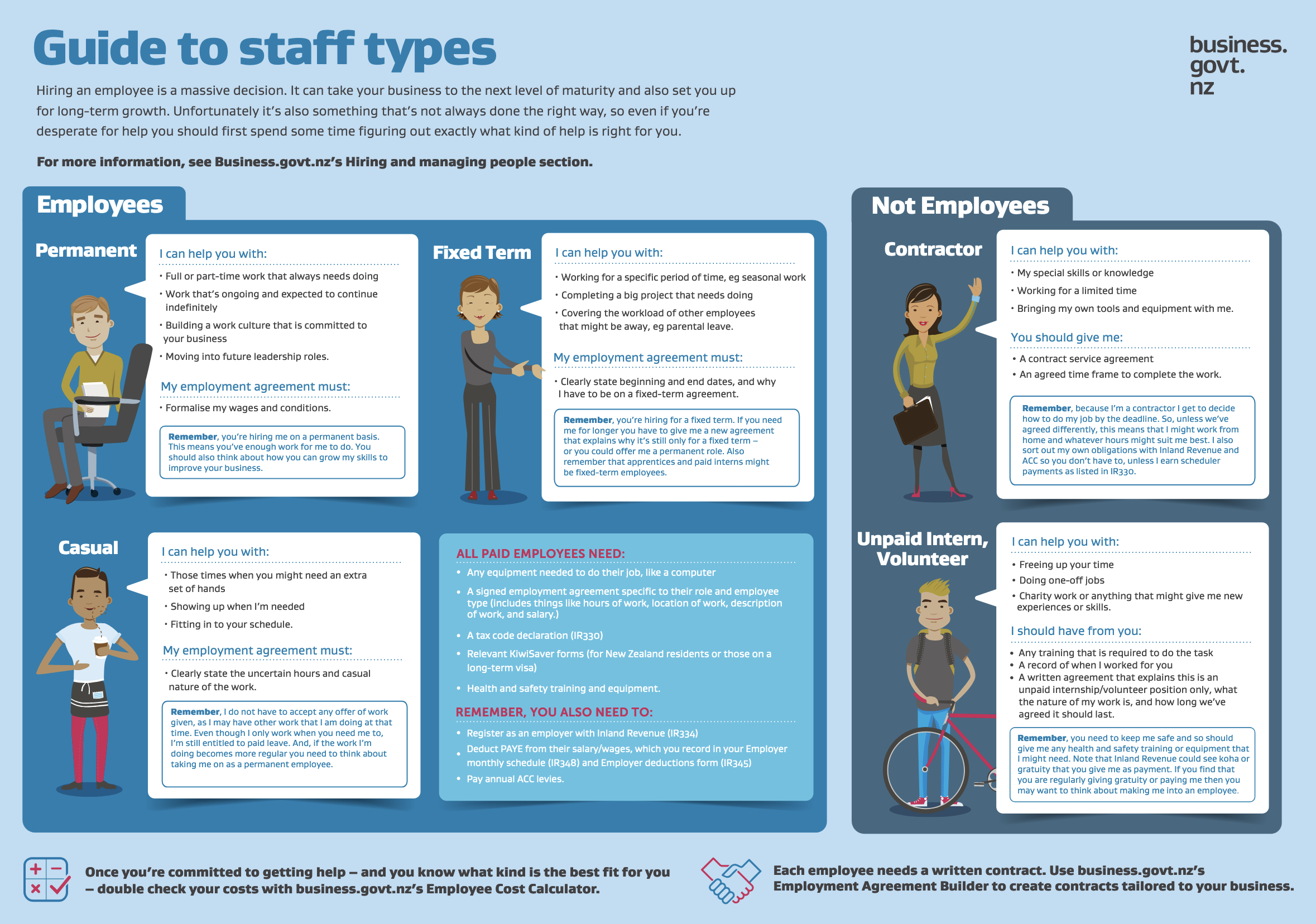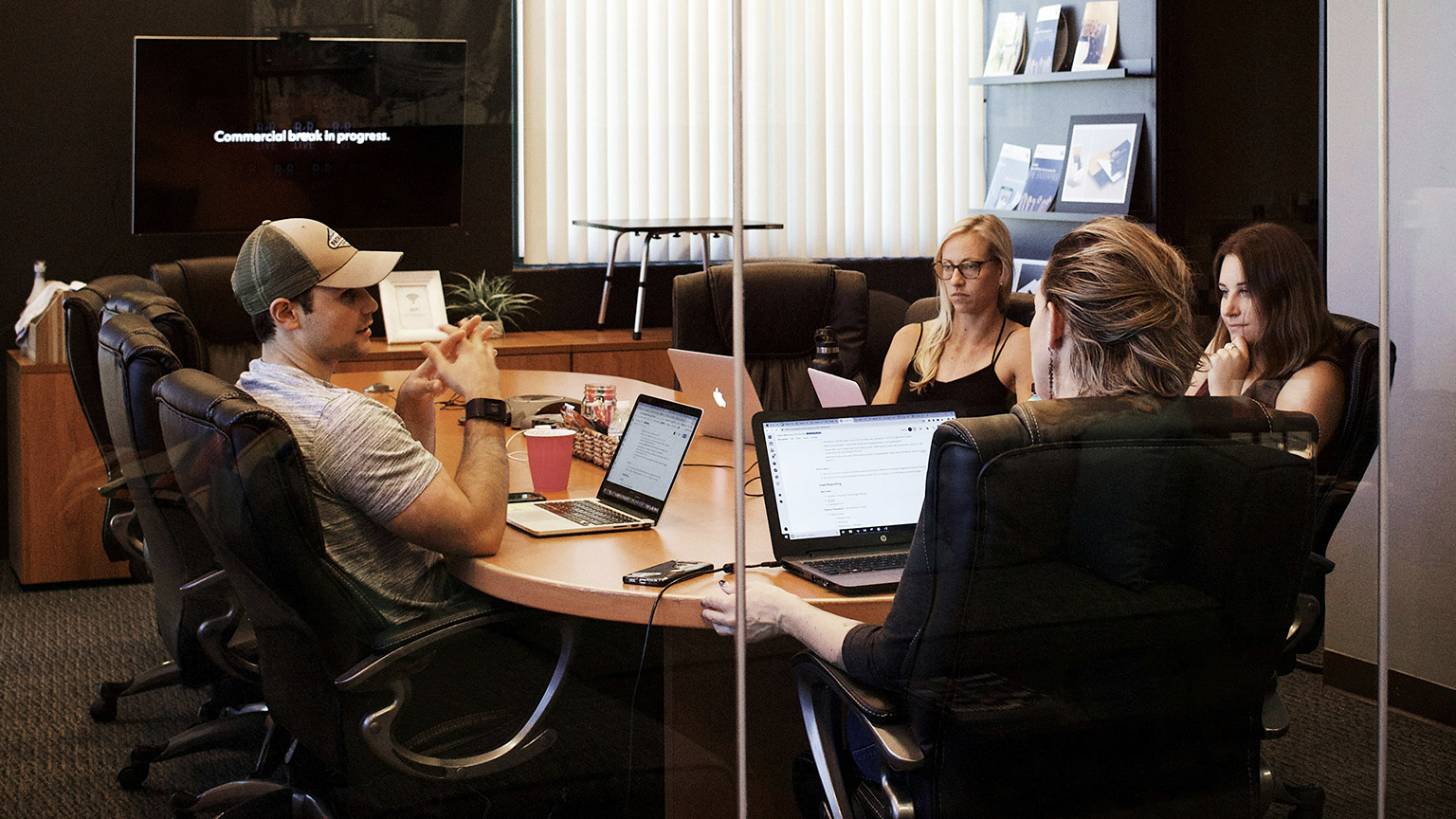Will you work alone, or do you plan on building a team to help spread the load? This is an important decision to make and several factors to consider. Whichever decision you make, it is important to do the right thing. Doing the right thing is good for you, your team and your business' and by putting people first, you'll comply with the regulations.
To set up or grow your business you’ll need to:
- Decide if you need staff and if so, in what capacity.
- Understand the differences between employees and contractors, in terms of your own staff or if you choose to do it alone.
- Ensure you pay yourself and any staff correctly and keep appropriate records.
- Keep people safe, including you, your staff, and anyone else who comes to your premises.
In this topic we’ll explore each of these points. You’ll notice that some link back to content in the previous topic. We will also be exploring both scientific and humanistic management theories. It will also be built on in the next module.
“Providing your team with a safe and healthy workplace is an important part of running a business. If employees feel their wellbeing is being looked after at work, they are usually more productive, healthier, and less stressed.” (business.govt.nz, no date h)
Hiring staff can be a big commitment. Let's look at some of the options that exist so you can decide what is best for your business now and in the future and has a positive effect on the people you employ.
Should you hire staff?
When thinking about hiring staff, consider:
- The mode of operation of the business: Will the business operate primarily online, or are customer-facing roles required?
- The size of the business: Can the business be run from one office, or will it need to be physically located in different regions?
- The specialist expertise required: Do you already have the knowledge and experience required to run the business, or will you need staff who possess the required specialist knowledge?
- Businesses should also consider the most appropriate, and where possible, cost-effective way to source specialist advice. This will depend on the type of business and the service it offers or the goods you sell. For example, if the business requires specialist services and advice frequently, it may be more appropriate for the business to employ staff with the necessary know-how. On the other hand, if the business requires expert knowledge infrequently, it may be more cost-effective to engage consultants, contractors, or advisors as and where required.
- The production requirements: How will your business produce its goods? Will they be produced in house or outsourced? This will impact the type of jobs required within the business.
Read this case study about Vicky Ha’s experience with the ups and downs of starting a new business and hiring staff: House of Dumplings: Taking on the world, one dumpling at a time
More information on subjects like policies and procedures and financial planning for staff will be covered further throughout this programme. For now we are interested in exploring different staffing options for small businesses.
If you are thinking about hiring staff, it is a good idea to download IRD’s First time employer guide which provides a good overview of different types of employment and includes information about registering as an employer.
Staff types
The image below provides a visual overview of different staff types. You can download a copy here.

Note that only some types of staff are employees. Contractors, unpaid interns, and volunteers are not considered employees. Irrespective of the types of workers you engage, you still need to provide safe working conditions for them. This article called Alternatives to hiring an employee provides a useful comparison between employees and contractors.
Being a contractor
As explained above, there is quite a difference between being an employee and being a contractor.
You may choose to engage contractors to help you do your work, or your business model might be based on contracting other businesses. In some cases both might apply. You could be contracting to a business and engaging subcontractors to carry out some parts of the work.
If you’re thinking about becoming a contractor, read What to consider before you start contracting.
Finding work as a contractor
Business.govt.nz provides 10 proactive tips to help you find contracting work:
- Use your networks
- Build a good reputation
- Make time to look for your next contract – put effort into this several months before you current contract expires as it can take a while to turn a lead into an signed contract
- Use recruitment agencies
- Keep your CV up to date
- Search job sites
- Be flexible
- Show you understand the client
- Don't get too settled
- Think about the time of year.
These are elaborated on further in this Business.govt.nz page called Finding contracting work.
You might also find it useful to set up a website or social media to advertise your services.
Contracts
Treat all contractual negotiations and agreements as well considered decisions. This article called What to watch out for in contracts looks at some of the common pitfalls when contracting.
Employee records and pay
Employee records
Employers are required to maintain accurate wage, time, holidays, and leave records in compliance with the Employment Relations Act 2000 and the Holidays Act 2003. It is essential to meet or exceed the minimum employment entitlements, such as the minimum wage, public holiday and annual leave entitlements.
Robust record-keeping ensures correct payment and leave administration, prevents misunderstandings, and provides protection in case of disputes.
Employees have the right to access and review their records and to point out where corrections are required. The Office of the Privacy Commissioner gives employers information about their rights and responsibilities here: Your privacy rights
Read this webpage called What do I need to do when record keeping, which provides a good summary of the records you're required to keep about employees and for how long you must securely store them.
Using digital tools such as project management software and mobile apps can help you run your business more efficiently and meet your record keeping requirements at the same time. In this short video (2:02) Simon and Kylie Dumble from Beechtree Building explain how they keep on top of their projects and staff records by using digital tools: Workflow management.
We’ll get into managing business information later in this topic and throughout this programme.
Paying employees

Paying employees the right amount on payday is critical for good employment relations.
There is a lot to learn about paying your employees, but here are some of the basics. You must:
- “pay at least the minimum wage
- legally pay employees in cash, unless you’ve agreed another method in writing, for example, their employment agreement
- pay employees as frequently as agreed in their employment agreement
- get their consent in writing to change the day or frequency they get paid
- pay annual holiday leave to staff before they go on leave, unless otherwise agreed in writing, eg in their employment agreement
- keep accurate records of all payments for at least 6 years.” (Things to know when paying your employees, no date)
Using payroll software that is designed specifically for use in Aotearoa will help avoid many of the pitfalls, but it’s still important to know your obligations, so spend some time learning about them here, before moving on: Things to know when paying your employees.
Paying yourself
As the owner of the business, the most straightforward way to pay yourself is:
- if you are a sole trader or a partnership: by withdrawing money from the business (known as drawings). Tax is calculated at the end of the tax year, and you’ll need to pay for that from the money you’ve taken out of the business, so set some of it aside throughout the year.
- If you are a company director: by paying yourself a salary or wage, in the same way as for employees. Taxes are paid through PAYE so you, as an individual won’t have to pay much, if any, income tax at the end of the tax year.
- Alternatively, company directors can use the drawings approach, however this has different tax implications. If you are trying to decide which option to go for, speak to an accountant or tax professional (Pay yourself, no date).
Health and safety (H&S) is important whether or not you have staff. If you don’t have staff you’re still responsible for your own safety and the safety of others on your premises or job sites you’re working at.
“A PCBU is a ‘person conducting a business or undertaking’. The PCBU has the primary duty of care – the primary responsibility for people’s health and safety at work. In general this means it must ensure the health and safety of its workers; any other workers it influences or directs; and other people who could be put at risk by the work carried out, for example, customers, visitors or the general public.” (Health and safety at work, no date)
As a business owner, you are considered a PCBU.
Watch this playlist of three videos from Worksafe New Zealand: Resources for workers and businesses, which gives a good overview of your legal obligations, or watch each individually here:
- What do you mean, Primary Duty of Care? (1:35 minutes)
- Worker Entitlements (0:54 minutes)
- Notifications: What you need to tell WorkSafe (2:15 minutes)
Health and safety is not just about physical wellbeing, it is also about looking after mental wellbeing. Watch the following video where Ahi shares what good mental wellbeing looks like in her workplace and how it affects her: Mentally healthy work: What good looks like with Ahi.
Activities
Watch: Health & Safety at Work Act presentation - Gordon MacDonald, former Chief Executive, WorkSafe NZ (23:40 minutes)
1: Pause the video while you type in the fill-in-the-blank answers below.
2: After you are done watching, reflect on your understanding of these terms and ideas, entering them into a document you can export and save to use as a summary.
Activity
Read the following and think about your responses to it, especially about your business.
Being a good employer is closely linked to being a good person. This is a person who people, including new acquaintances, like being around and who others choose to spend time with, even when they don’t have to.
Characteristics which translate from being a good person into being a good employer are that they are:
- honest in their dealings with others
- genuinely care about how others are doing, about the progress they’re making and where they encounter barriers or problems
- respectful of all others, including children, seniors, those without obvious ‘power’ and those who may not always know what they want but think that help might be available if they seek it out.
In relation to Health and Safety, the ‘people elements’ that will make your business more successful in your relationships with employees, customers and visiting suppliers mean that you:
- know what the hazards and risks are in your business and you’re honest and open about what you’re doing to reduce or eliminate their effects, especially with employees (who often pick up health and safety issues long before you might)
- you genuinely wish for people to encounter your business offerings in a safe and well-managed way, without being overly prescriptive or litigation-focused
- you welcome comments or ideas from others to help you all manage hazards and risks in the business together, and regularly show how you are using that input to improve the situation
- you know that fixing problems can be costly, but you also know that prevention can reduce those costs if the issues are addressed early.
Things to ponder:
- Is being ‘a good person’ too much of a high bar to expect an employer to aim for?
- Is being ‘a good employer’ going above and beyond the need that exists, and would it be better just to do the minimum so that you don’t get caught out if you ever get taken to court or an employment or Worksafe hearing?
- What are the aspects of your own personality that might make H&S a pain for you or make it the logical thing to willingly do.
- What would be more important in your workplace:
- having a forklift driver who is trained to use the forklift, wears hi-viz clothing, complies with all the requirements, but can’t see the point of it all and plays practical jokes on others at work when he’s not driving the forklift? or
- having an untrained employee who wishes to work on the forklift one day but isn’t yet confident enough, hasn’t been trained, is keen to learn to comply and has a mature, responsible attitude to other work hazards and employee relationships?
The following resources provide more in-depth information about health, safety and wellbeing at work. You might like to bookmark them as they’ll come in handy later in the programme:
- Health and safety at work – A brief introduction to health and safety in the workplace
- Worksafe website

Scientific management
In the 1880s and 1890s in the United States Frederick Taylor began to study the time it took workers to complete common tasks in a steel factory, which eventually led to the theory of scientific management.
Scientific management, also referred to as Taylorism, became seen by workers and unions as a way of turning workers into machines – or ‘robots’, by requiring them to follow small, repetitive, specific procedures and not allowing opportunity for further exploration. It also led to a sense of monotony by forcing workers to do “one small and rigidly defined piece of work instead of using complex skills with the whole production process done by one person” (Wikipedia contributors, 2023c). Perhaps not surprisingly, there was significant criticism of scientific management.
“Although scientific management as a distinct theory or school of thought was obsolete by the 1930s, most of its themes are still important parts of industrial engineering and management today. These include: analysis; synthesis; logic; rationality; empiricism; work ethic; efficiency through elimination of wasteful activities…; standardization of best practices; disdain for tradition preserved merely for its own sake or to protect the social status of particular workers with particular skill sets; the transformation of craft production into mass production; and knowledge transfer between workers and from workers into tools, processes, and documentation.” (Wikipedia contributors, 2023c)
Humanistic management
Humanistic management, on the other hand, is about treating people as individuals who have an intrinsic value as human beings first and foremost.
This short explanation provides a good overview of humanistic management: What is humanistic management?
If you’re interested in a more detailed description, you might like to read Understanding humanistic management (Melé, 2016).
Some ways of recognising your staff as individuals and treating them with dignity include:
- Becoming a Living Wage Employer
- Ensuring you pay your staff fairly for their work, skills and experience, irrespective of gender, ethnicity. Information about gender pay equity can be found on the Employment New Zealand website: Pay equity process
- Implementing diversity and inclusion initiatives. You might choose to apply to become a Rainbow Tick certified organisation.
By treating people with dignity, and using digital tools to reduce manual work, you can improve the efficiency of your business, increase staff satisfaction with their work and create an enjoyable workplace at the same time.
Summary
In this topic we’ve introduced people management and some key points you’ll need to consider when it comes to making decisions concerning hiring and managing people. We’ve covered the main types of staff you might need to take on and your responsibilities for keeping them safe and storing their personal information. We’ve also covered considerations for sole traders, including tips for being a contractor. We concluded this topic by linking the content of this section back to some business management theories.
We’ll go into how to lead people and manage work in more depth later in this programme.
